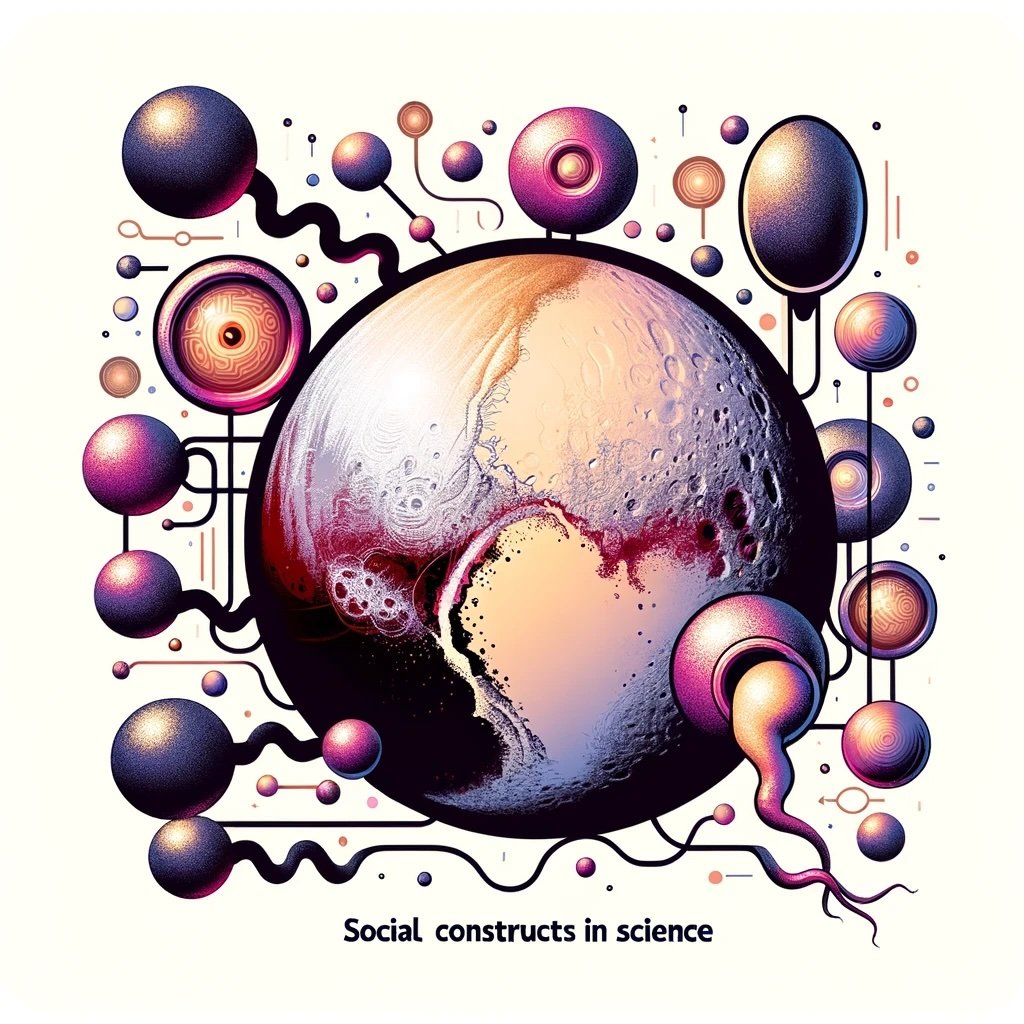Welcome to my blog!
Every morning, I begin with a cup of coffee and 15 minutes of free thinking. I write down everything that comes to mind, from new ideas to thoughts that emerged overnight. This is where I develop and refine my new research. You'll find some repetition and ideas still in progress. Some might seem unusual or unclear at first, but that's part of the journey! I'm excited to share how my ideas form and evolve.
Exploring the relationship between logic and language, and questioning whether this relationship ultimately leads to psychologism.
Examining the central role of language in Twentieth-century analytical philosophy and the relationship between language, thought, and logic.
Exploring the distinct roles of logic and mathematics in understanding material and conceptual coherence, and how each contributes to different domains of reasoning.
Examining the possibility of non-violent change in addressing epistemic oppression and the potential for a "quiet revolution" in rebalancing societal powers.
Exploring the limitations of traditional Marxist theory in addressing modern societal complexities and the emergence of epistemic powers that shape contemporary inequities.
Today, I have the great honour of having a friend and colleague, Dr. Padriac O'Leary, contributing to Logic in the Wild blog. Dr. O'Leary recently joined the Computer Science department at the University of Auckland after completing a Ph.D. in philosophy with Prof. Fred Kroon. Today, Padriac elaborates on the idea of "logical impressionism," delving into its role in preserving coherence in complex contexts and its distinction from formal logic and rhetoric.
Exploring the principle of the climber’s agreement in the climbing community and proposing a similar approach to coherence and understanding in logical discourse.
Exploring the intersection of social epistemology and logic, examining how knowledge and coherence are affected when perspectives are pooled in a community.
Boolean negation inherits the law of non-contradiction from mathematics, but does it also get the rule of explosion? Exploring the implications of Boolean negation for logical consistency and the potential for coherent reasoning in the presence of inconsistency.
Exploring how intersectionality challenges the concept of sex as a binary or spectrum and invites us to view it through a pluralistic manifold.
Exploring the intersection of practice and theory in logic, and how a richer approach enhances both.
Exploring Andrea Nye's critique of logic and the challenges of addressing gender symbolism in philosophical discourse.
Examining the historical exclusion of women from the domain of logic and how feminism reveals the unequal distribution of epistemic power and the fabrication of gendered reasoning.
Exploring how Ancient Greek notions of harmony reveal the essence of logical thinking as a pursuit of coherence, connecting music, mathematics, and the cosmos.
This post explores how the term ‘logic’ is used in various contexts, from political ideologies to natural processes, and questions whether it genuinely reflects logical reasoning in the scenarios it describes.
In this post, I explore the implications of the "Kiwi Before Iwi" slogan and its strict adherence to the logic of equality, questioning whether it truly serves justice or perpetuates inequality.
This post explores the distinctions between neutrality, equality, and equity in logical discourse, emphasizing the importance of creating a fair and inclusive space for dialectical enquiry. While neutrality aims for equal treatment, true equity ensures that all voices are heard and valued, preventing the erasure of marginalized perspectives.
This post explores David Lewis's theory of modal realism, which posits the existence of possible worlds to account for our modal discourse, and asks whether this view is coherent and cogent.
This post delves into the complex task of defining the self, examining the role of logic in providing coherence to our understanding of identity and presence in the world.
This post explores the intriguing connection between logical thinking and authenticity, suggesting that coherence rather than truth might be the key to understanding our true selves.
Exploring a concrete example of logic in everyday life, this post challenges the perception of logic as an emotionless, external tool. It highlights how logic protects us by guarding coherence in reasoning, rather than dictating surprising, non-human decisions.
This post explores the principle of charity in argumentation, emphasizing the importance of interpreting others' arguments generously and the role of logic in fostering charitable discourse.
This post explores the necessity of logic in community development, highlighting how logical interaction fosters a neutral space for dialectical enquiry, enabling diverse perspectives to find common ground without imposing majority beliefs.
In this post, I explore how epistemic structures, akin to Kuhn's scientific paradigms, can become oppressive logical monsters. These structures, passed down through generations, resist change and contribute to systemic injustice. Can seeking coherence in dialectical enquiry offer a path to overcoming cultural incommensurability and fostering better communication across paradigms? Is a Kuhnian analysis the right approach to understand epistemic oppression?
Short description: This post explores the concept of "emerging structural oppression," examining how power structures evolve and perpetuate systemic and epistemic oppression, with a focus on the role of logic in reinforcing these injustices.
his post explores how logic can be systemically oppressive, drawing on the works of Fricker, Dotson, and Mills to examine the intersection of epistemic injustice, white ignorance, and the inertia of dominant epistemic systems.
This post asks why we keep interrupting each other. Is it out of good intentions? Learn how a simple trick of posing uptake questions can help us do better.
This post explores the importance of engaging with a logical mindset in discussions, using a personal experience to illustrate how logical enquiry can foster constructive communication.
This post explores whether logical injustice is a distinct kind of injustice or if it is reducible to social injustice, drawing parallels with epistemic and hermeneutical injustices.
Examining the ways populism exploits incoherence and bad logic to make truth irrelevant, and the dangers this poses to political discourse.
Examining the possibility of non-violent change in addressing epistemic oppression and the potential for a "quiet revolution" in rebalancing societal powers.
Exploring the limitations of traditional Marxist theory in addressing modern societal complexities and the emergence of epistemic powers that shape contemporary inequities.
This post explores how the term ‘logic’ is used in various contexts, from political ideologies to natural processes, and questions whether it genuinely reflects logical reasoning in the scenarios it describes.
In this post, I explore the implications of the "Kiwi Before Iwi" slogan and its strict adherence to the logic of equality, questioning whether it truly serves justice or perpetuates inequality.
This post challenges the rapid-fire nature of social media interactions and proposes the concept of "logic duty" as a civic responsibility to deliberate on societal issues, encouraging deeper understanding and coherent decision-making beyond the divisive echo chambers.
This post explores how learning logic not only sharpens individual reasoning and debate skills but more importantly serves as a foundational tool for fostering societal cohesion and constructive dialogue.
This post discusses the nuanced question of whether accusations of racism can themselves be racially motivated, especially in light of recent criticisms by NZ political leaders against designated spaces for Māori and Pacifica students.
This blog addresses the contentious debate surrounding designated spaces for Māori and Pacifica students at The University of Auckland, refuting accusations of racism with a nuanced discussion on community, identity, and the tu quoque fallacy.
This blog post is a response to Winston Peters' "state of the nation" speech, focusing on his incoherent analogy between the Labour Party and Nazi Germany, and and denouncing his deployment of inflammatory demagogical rhetoric in prominent New Zealand's political discourse.
This post examines how demands for equity by marginalized groups are often misinterpreted as calls for special treatment, particularly when these groups are ethnic minorities, using a notable speech by Don Brash as a case study.
This post critiques the divisive rhetoric of New Zealand's political leaders, urging a more mature approach to discourse while preserving the passionate critique embedded in the original argument.
This post explores the nuanced dynamics of group versus individual accountability, particularly in historical and social justice contexts, emphasizing the complexity of attributing actions and consequences across different societal levels.
This post explores how the interpretation of the Treaty of Waitangi's translations can lead to a form of oppression through the imposition of foreign logical frameworks on Māori concepts, using the term 'tikanga' as a key example.
In this post, we examine abstract equality through logic and its potential to overlook the experiences of marginalized groups.
Exploring the value of a father's advice, "Shut up and listen!", this post urges leaders to embrace active listening in the context of Waitangi weekend.
This post explores how narrowing our focus from broad generalizations to specific groups reveals deeper truths and addresses social inequities.
Is societal justice about treating everyone identically, or does it demand a more nuanced, equitable approach?
This post explores the tension between logical neutrality and the erasure of individual identities in New Zealand's political landscape, examining the implications for Māori communities.
Exploring the crucial role of logical integrity in political decision-making, this post examines the varied application of logic in politics through the case of New Zealand Prime Minister Christopher Luxon's early actions and statements, emphasizing the need for consistent logical reasoning in governance.
This piece delves into the nuanced spectrum between competition and cooperation, questioning traditional views of these concepts and exploring their roles in both natural and human-made systems.
In this post, I explore the forest as a metaphor for competition and cooperation, contrasting the individualistic struggle for resources with the collaborative symbiosis of the ecosystem, and introducing relational ontology as a holistic view that transcends these dualities.
This blog delves into the concept of relational identity, drawing from Māori philosophy and Anne Salmond's work, to explore how identity extends beyond personal confines and encompasses a holistic network of relationships, particularly within the LGBTQ+ community.
Exploring the principle of the climber’s agreement in the climbing community and proposing a similar approach to coherence and understanding in logical discourse.
This post explores the principle of charity in argumentation, emphasizing the importance of interpreting others' arguments generously and the role of logic in fostering charitable discourse.
Exploring logical injustice, the post emphasizes the importance of using appropriate logical standards in everyday discussions and decision-making.
Drawing from the traditional principle of charity, I introduce the Principle of Logical Charity, encouraging the treatment of others' views as both intelligent and logically coherent in conversations.
In this blog post, I explore how my journey as a logician, initially focused on abstract content, evolved to embrace real-world interactions, from teaching diverse students to considering feminist critiques and the nature of metaphysics and mathematics.
Exploring the distinct roles of logic and mathematics in understanding material and conceptual coherence, and how each contributes to different domains of reasoning.
Exploring how Ancient Greek notions of harmony reveal the essence of logical thinking as a pursuit of coherence, connecting music, mathematics, and the cosmos.
This post explores how the term ‘logic’ is used in various contexts, from political ideologies to natural processes, and questions whether it genuinely reflects logical reasoning in the scenarios it describes.
This post delves into the complex task of defining the self, examining the role of logic in providing coherence to our understanding of identity and presence in the world.
This post explores the intriguing connection between logical thinking and authenticity, suggesting that coherence rather than truth might be the key to understanding our true selves.
Exploring a concrete example of logic in everyday life, this post challenges the perception of logic as an emotionless, external tool. It highlights how logic protects us by guarding coherence in reasoning, rather than dictating surprising, non-human decisions.
his post explores how logic can be systemically oppressive, drawing on the works of Fricker, Dotson, and Mills to examine the intersection of epistemic injustice, white ignorance, and the inertia of dominant epistemic systems.
This post explores whether logical injustice is a distinct kind of injustice or if it is reducible to social injustice, drawing parallels with epistemic and hermeneutical injustices.
This blog post introduces the concept of logical injustice, exploring its parallels with epistemic and hermeneutical injustices, and discusses how failing to appreciate the coherence in someone's thoughts constitutes this new form of injustice.
In this blog post, I propose the rule of trivialisation as a generalisation of the logical rule of Explosion, and I discuss difficulties in finding practical ways of using it. I question whether absurdity could provide a new metric for assessing logical coherence.
This blog post discusses the rule of explosion in logic, which posits that from any contradiction, everything follows—resulting in what is known as triviality. I explore the limitations of this principle and introduce a nuanced approach termed 'trivialisation' that seeks to redefine how we measure coherence without insisting on strict consistency.
This blog post explores the intricate relationship between logical and conceptual choices, questioning whether decisions based solely on definitions can exist independently of logical connections, and how logic imposes boundaries on conceptual behavior.
This blog post discusses the principle of explosion in logic, exploring how it traditionally mandates that any contradiction leads to everything becoming true, and why some modern logicians choose to reject this rule to handle inevitable contradictions more gracefully.
This post examines how logic extends beyond mere truth-seeking, illustrating its role in understanding coherence in historical scientific theories and contemporary societal debates, from ancient optics to modern sports equity.
This post examines the transition from the symbolic complexities of logic to its practical applications in daily life, questioning how deeply the principles of logical theory influence our everyday reasoning.
Exploring the role of logic in enhancing personal understanding and improving community interactions, facilitating a bridge between differing perspectives.
This post explores the deep-seated issues of epistemic injustice faced by queer and trans individuals, highlighting the pivotal role of language and community in affirming identity and the dire consequences of its absence.
This blog post is a response to Winston Peters' "state of the nation" speech, focusing on his incoherent analogy between the Labour Party and Nazi Germany, and and denouncing his deployment of inflammatory demagogical rhetoric in prominent New Zealand's political discourse.
In this post, the Logic in the Wild framework is employed to refresh feminist critiques of logic, steering away from evolutionary simplifications and gender symbolism errors.
Exploring a friend's journey with Jesus, this post reveals how his faith leads to a profound appreciation for the beauty in every individual, transcending traditional religious divides.
This post explores the ethical implications of logical coherence through the lens of Viktor Bout's life, illustrating how logic's misuse can lead to morally questionable outcomes.
Exploring the value of a father's advice, "Shut up and listen!", this post urges leaders to embrace active listening in the context of Waitangi weekend.
Can harmony be considered as a guardian of coherence?
This post explores the intersection of logic and empathy in understanding others, highlighting the limitations of empathy in our socially fragmented world and the role of logic as a 'guardian of coherence'.
In this post, I explore how changing content in a farcical setting, as shown in "Happiest Season," dramatically shifts its narrative impact from comedy to tragedy, prompting reflection on what this teaches us about logic and coherence when contexts are altered.
In this post, I examine Barbie's pearl of wisdom from her latest movie, revealing the enriching balance between logic and emotion.
o conclude a provocative blog week, this post defends dialetheism, weaving together this unique philosophical perspective with the ideas of validity as a social construct and logical nihilism.
Revisiting the concept of validity as a social construct, this post incorporates insights from Gillian Russell and logical nihilism, enhancing the understanding of logic as 'the guardian of coherence' in 'Logic in the Wild'.
Logic in the Wild argues against the conventional formal/informal logic divide, showcasing logic as a multifaceted guardian of coherence across various domains.
Exploring the crucial role of logical integrity in political decision-making, this post examines the varied application of logic in politics through the case of New Zealand Prime Minister Christopher Luxon's early actions and statements, emphasizing the need for consistent logical reasoning in governance.
This post explores the intersection of logic and empathy in understanding others, highlighting the limitations of empathy in our socially fragmented world and the role of logic as a 'guardian of coherence'.
o conclude a provocative blog week, this post defends dialetheism, weaving together this unique philosophical perspective with the ideas of validity as a social construct and logical nihilism.
This post examines the challenging demands of empathy in a polarized world and proposes logic as a vital tool to bridge understanding and foster empathy amidst diverse viewpoints.
Explore how the social constructs of sex, race, homosexuality, and heterosexuality are shaped by societal norms and scientific inquiry, revealing the intricate ways in which our understanding of identity is formed and challenged within the evolving landscapes of society and science.
Exploring the intricate link between gender identity and biological sex, this post investigates how societal constructs around 'man/woman' influence our understanding of the 'male/female' distinction. It questions the origins of social pressure that shapes our perceptions, challenging us to rethink the boundaries between biological realities and cultural expectations.
Highlighting the realization that societal pressures can lead science to alter its definitions, this post ventures into the intricate relationship between biology, astronomy, and the social constructs of sex and planetary classification.
Today, I have the great honour of having a friend and colleague, Dr. Padriac O'Leary, contributing to Logic in the Wild blog. Dr. O'Leary recently joined the Computer Science department at the University of Auckland after completing a Ph.D. in philosophy with Prof. Fred Kroon. Today, Padriac elaborates on the idea of "logical impressionism," delving into its role in preserving coherence in complex contexts and its distinction from formal logic and rhetoric.
Exploring the relationship between logic and language, and questioning whether this relationship ultimately leads to psychologism.
Examining the central role of language in Twentieth-century analytical philosophy and the relationship between language, thought, and logic.
Examining the possibility of non-violent change in addressing epistemic oppression and the potential for a "quiet revolution" in rebalancing societal powers.
Exploring the limitations of traditional Marxist theory in addressing modern societal complexities and the emergence of epistemic powers that shape contemporary inequities.
Exploring the intersection of social epistemology and logic, examining how knowledge and coherence are affected when perspectives are pooled in a community.
Boolean negation inherits the law of non-contradiction from mathematics, but does it also get the rule of explosion? Exploring the implications of Boolean negation for logical consistency and the potential for coherent reasoning in the presence of inconsistency.
Exploring the intersection of practice and theory in logic, and how a richer approach enhances both.
Exploring Andrea Nye's critique of logic and the challenges of addressing gender symbolism in philosophical discourse.
Examining the historical exclusion of women from the domain of logic and how feminism reveals the unequal distribution of epistemic power and the fabrication of gendered reasoning.
Exploring how Ancient Greek notions of harmony reveal the essence of logical thinking as a pursuit of coherence, connecting music, mathematics, and the cosmos.
This post explores David Lewis's theory of modal realism, which posits the existence of possible worlds to account for our modal discourse, and asks whether this view is coherent and cogent.
This blog post explores the role of logic as an epistemic tool, clarifying that while it does not directly determine truth, it is crucial in structuring knowledge. The discussion also touches on the concept of epistemic injustice and how denying logical tools can perpetuate systemic biases.
This post challenges the rapid-fire nature of social media interactions and proposes the concept of "logic duty" as a civic responsibility to deliberate on societal issues, encouraging deeper understanding and coherent decision-making beyond the divisive echo chambers.
This post examines how logic extends beyond mere truth-seeking, illustrating its role in understanding coherence in historical scientific theories and contemporary societal debates, from ancient optics to modern sports equity.
This post explores the perceived divide between the complex theories of formal logic and the practical logic we employ daily, bridging the gap between specialized academic knowledge and everyday reasoning.
This blog post explores Miranda Fricker's concept of testimonial injustice, examining whether epistemic injustice is appropriate unless knowledge is somehow objective.
Exploring a friend's journey with Jesus, this post reveals how his faith leads to a profound appreciation for the beauty in every individual, transcending traditional religious divides.
Exploring the depth of coming out, this post argues it encompasses far more than sexual preferences, embodying a rich identity and presence within the community.
Demonstrating how logic, as the guardian of coherence, directly led to the invention of the modern computer, transforming abstract theories into the foundation of today's technology.
This post explores classical logic, not as the logic of ancient times, but as a twentieth-century European development, focusing on its evolution from public debate tools to the formal languages shaping modern mathematics.
This post challenges the conventional understanding of evolutionary success, exploring the logical fallacies often embedded in patriarchal frameworks of biological interpretation.
This blog post challenges the prevalent notion that logic is alien to human nature, suggesting instead that it is an intrinsic tool evolved from our limitations.
After watching "Oppenheimer," a film about a pivotal scientific development, I'm inspired to share a thought-provoking quote from Rev. Māori Marsden's "The Woven Universe," offering a unique perspective on this historical moment.
In this post, I explore how changing content in a farcical setting, as shown in "Happiest Season," dramatically shifts its narrative impact from comedy to tragedy, prompting reflection on what this teaches us about logic and coherence when contexts are altered.
This post explores the challenges and potential solutions in addressing intersectional oppression through the lens of top-down and bottom-up logical approaches, inspired by the limitations of ceteris paribus logic in social contexts.
Exploring the WSCM equation, this post navigates through how upward and downward dynamics of oppression and privilege redefine intersectionality and call for a unified approach to social justice.
This post challenges the long-standing myths that marginalized groups possess lesser intellect, using intersectionality to highlight the absurdity of such claims.
This post explores the tension between logical neutrality and the erasure of individual identities in New Zealand's political landscape, examining the implications for Māori communities.
I examine the 'same logic, same response' slogan, focusing on its limitations.
Gender Symbolism in Logic
Exploring Andrea Nye's critique of logic and the challenges of addressing gender symbolism in philosophical discourse.
Andrea Nye developed a thorough rejection of logic in her book *Words of Power*. I take the book to be a form of “intellectual impression,” in which Nye articulates an interpretation of logic based on her lived experience as an outsider of the field, not part of the “gentlemen’s club,” and told about a way to access universal knowledge with maximal abstraction. Instead of presenting her perspective by way of arguments, her book is a response. I’ve been writing about this, and it’s a challenging text to write about, especially because it isn’t written to provide articulated reasons. But I fully respect the approach because I don’t think that logic is necessary or even sufficient for effective (read convincing) communication. Rhetoric has many tricks up its sleeve, and articulated reasons aren’t always the ones to favour.
While Nye may not present arguments in the traditional sense, she writes in coherent ways, which according to "Logic in the Wild," is all you need for logical reasoning to be established. What she’s not submitting to is the practice of seeking coherence with the strict logical standards of Twentieth-century logicians, those to whom the critique is ultimately directed. What’s her response? That logic is a male-fabricated tool that has liberated men in the public and academic spheres, eventually elevating them to the level of God and universal knowledge via abstraction, while keeping women away from it, back in their households, with their private knowledges.
One thing I find particularly difficult to write about is achieving fairness towards Nye’s belief about the difference in knowledges between the sexes. There’s a difference between saying that logic is masculine and passion (or emotion?) is feminine and saying that there are different ways of accessing knowledge—via logic or via passion—and that the former is traditionally ascribed to men, the latter to women. To say that logic is masculine is to commit the fallacy of gender symbolism, i.e., to ascribe gender to inanimate things. Gillian Russell’s reply to Nye isn’t to deny the impression she articulated but to rectify the slippery gender symbolism in the articulation.
References:
Nye, Andrea. Words of Power: A Feminist Reading of the History of Logic. 1st ed. Routledge, 2019. https://doi.org/10.4324/9780367854447
Russell, Gillian. “Logic: A Feminist Approach.” In Philosophy for Girls, by Gillian Russell, 79–98. Oxford University Press, 2020. https://doi.org/10.1093/oso/9780190072919.003.0007
What does feminism have to do with logic?
Examining the historical exclusion of women from the domain of logic and how feminism reveals the unequal distribution of epistemic power and the fabrication of gendered reasoning.
There’s no logical difference between men and women regarding their logical abilities or faculties. Do I really need to say that? Today? European men have created a space of enquiry where only men were allowed. Logic and reason, said the ancient Greeks, were for men. For women? Emotions and passion. Emotions and passion had to be tamed by logic and reason. Logic vs. reason; a very old saga. But that was entirely fabricated by men, starting with Aristotle in logic, and propagated over the ages.
With the Enlightenment and the Cartesian abstracted ego, man elevated himself to the equal of God, becoming the source of truth, and leaving women below. Man became the equal of God while women were kept slaves to their passions. Eventually, with the formalisation of logic, even Man got abstracted away, for what? For Mathematics? For Truth? Once women managed to leave their homes and regain access to society, there was nothing left but pure logic, man’s best friends, the totally abstracted and neutral ways of universal thinking. How dare she ask about her embodied self and situated knowledge? How dare she question the origins of the pure laws of thought? How dare she doubt the glorious male ego?
What does feminism have to do with logic? Precisely that! To reveal a history of self-gratification and abstraction. To reveal the unequal distribution of epistemic power and shared epistemic tools. To reveal how the fabric of society inherited a fabricated structure of reasoning, a combative and competitive quest for truth, the imposition of masculine coherence in every enquiry.
Logical Injustice: A New Dimension of Wronging Reasoners
This blog post introduces the concept of logical injustice, exploring its parallels with epistemic and hermeneutical injustices, and discusses how failing to appreciate the coherence in someone's thoughts constitutes this new form of injustice.
Epistemic injustice is to wrong someone in their capacity as a knower; hermeneutical injustice is to wrong them as an understander. What I propose is that logical injustice is to wrong them in their capacity as a reasoner. To wrong someone as a reasoner is to fail to appreciate the coherence in their thoughts. I want to discuss whether logical injustice is subject to the same problem as epistemic and hermeneutical injustice, namely that the injustice is neither genuinely epistemic nor hermeneutical, but rather reducible to prejudices and social injustice.
Kristie Dotson, for instance, distinguishes three levels of epistemic injustice, only one of which is genuinely epistemic; the other two are not because the reparation doesn’t require a change in the shared epistemic tools. It’s only when an injustice is propagated by the inertia of the dominant epistemic systems that resist change or accommodation that the injustice is genuinely epistemic. If the injustice is the historical exclusion of women from philosophy, the injustice is reducible to patriarchal injustice, not something specifically epistemological. Some women were given enough space to contribute to the growth of philosophical knowledge, and they could contribute without having to change or add to the dominant epistemological tools. Maybe a case like that is Émilie du Châtelet, who found a way to contribute to philosophy, not by changing how it’s done, but by breaking through the ranks. I’m simplifying here.
In contrast, I think a modern example of a proper epistemological injustice, one that is due to the inertia of the dominant theories, is the exclusion of trans people from contributing to knowledge. If I understand Dotson correctly, the exclusion is due to the resistance of established knowledge systems to change the conceptual space of sex and gender to appreciate the expression of alternative identities. Established epistemological tools can at best accommodate a trans person as being “both a man and a woman” or “neither a man nor a woman.” However, this is far removed from the knowledge, understanding, and reasoning that trans people have and can contribute, but aren’t allowed to because it doesn’t fit within the established epistemology. I believe this is what Dotson means by irreducible epistemic injustice due to the inertia of dominant epistemology.
Now that we can appreciate what irreducible injustice means, we can ask how epistemic, hermeneutical, and, what I wish to contribute, logical injustice, differ.
Reference: Dotson, Kristie. “Conceptualizing Epistemic Oppression.” Social Epistemology 28, no. 2 (April 3, 2014): 115–38. https://doi.org/10.1080/02691728.2013.782585.
Reason as a Social Construct
This post explores how the concept of reason is a social construct shaped by historical power dynamics.
Yesterday, while reading Genevieve Lloyd's "The Man of Reason," a realization dawned on me: reason is a social construct. This insight reshaped my understanding, highlighting how the conception of reason is steered by those wielding greater societal power: men. Similar to other constructs, like gender, the notion of reason aligns with a historical trajectory in Europe that predominantly celebrated male freedom—manifested through political engagement, academic presence, and leadership roles—while relegating women to domestic spheres, thus perpetuating their subordination.
Engaging more deeply with critical theory, across the domains of feminism, queer theory, and post-colonial studies, I've noticed a pervasive pattern: our societal structure is steeped in systematic dualisms, a concept I've borrowed from Plumwood. These dualisms serve to both reinforce and normalize the oppression of marginalized groups. Despite this broader exploration, today, I'm particularly drawn to the concept of reason. When I first encountered Kant's "Critique of Pure Reason" as a teenager, and upon revisiting it in subsequent years, it didn't strike me that his critique extends beyond assessing how people employ reason or defend their understanding of it. Rather, Kant was engaged in redefining and adapting reason to align with the Enlightenment's values. This necessitated a departure from the confines of ancient Greek philosophies and medieval Christian dogma, making room for the burgeoning field of science. And the concept of reason had to be reconstructed accordingly.
The discourse on reason doesn't align with a clearly defined concept that has been progressively refined, unlike our growing understanding of fields such as optics or astronomy. Traditionally, the concept of reason has positioned men at a societal advantage, conferring upon them a privileged status. This advantage is intricately linked with the evolution of democracy, drawing a contrast with the stereotypically "passionate" nature attributed to women. Despite ongoing critiques from feminist and other critical perspectives, this bias doesn't merely persist—it remains pervasive in society. Women are often depicted as overly emotional or dramatic in leadership positions, while men are still viewed as the rightful exemplars of reason.
But what exactly is reason? It does not directly correspond to neural processes, as some philosophers might suggest, but rather seeks to define patterns of reasoning, decision-making, and truth-seeking. What is it about? I am not advocating for the elimination of the concept from discourse; rather, I had not previously considered the potential to question its very foundations. Now, equipped with these questions, I recognize how constructions of reason contribute to sustaining an unjust distribution of power within society.
The exploration of reason as a socially constructed concept, influenced by historical power imbalances, invites us to reconsider its application and significance. By understanding its roots and questioning its current role, we can begin to challenge the structures that perpetuate inequality, opening the door to a more inclusive and equitable philosophical discourse on reason.
Reference: Lloyd, Genevieve. The Man of Reason : “Male” and “Female” in Western Philosophy. 2nd ed. London: Routledge, 1993.
Bridging Feminism, Ecology, and Logic: The Eco-Feminist Perspective
This post explores how eco-feminism extends feminist insights to the relationship between humans and the natural world, highlighting Val Plumwood's conceptual analysis of dualism that connects feminism, ecology, and logic.
What does feminism have to do with ecology? This intersection is known as eco-feminism. But then, what role does logic play in this discourse? Ecology, as defined in my dictionary, is "the branch of biology that deals with the relations of organisms to one another and to their physical surroundings." At a glance, one might see how a feminist lens could be applied to such relations, given that feminism critically examines the dynamics between men and women. However, if we were to limit the connection to this parallel alone, the link between feminism and ecology might seem tenuous. Eco-feminism, therefore, is not merely about drawing superficial parallels but about applying and, in some cases, generalizing the critical insights of feminism regarding the relationships between men and women to those between humans and the non-human world.
Eco-feminism, in essence, extends the feminist critique of the relationship between men and women to include our interactions with non-human animals and nature. While it's clear that animals and nature do not engage in societal functions as humans do—they don't marry or form political parties—the focus of eco-feminism is on identifying connections rather than dwelling on these differences.
Val Plumwood, a philosopher and logician, performed a conceptual analysis of the power dynamics between men and women in terms of "dualism", offering a systematic framework for understanding not only the relationship between man and women, but other relationships such as that between humans and animals or nature. A dualism “results from a denied dependency on a subordinated other. Denied dependency determines a logical structure of domination/subordinatio that shapes the identity of both the relata.”(Plumwood, p.41).
Dualism encompasses various binaries, such as master/slave, reason/passion, men/women, and extending to human/animals and human/nature. Plumwood, applying her analytical logician skills, delineates necessary and sufficient conditions for a dualism, including "backgrounding," "hyperseparation," "relational definition," "instrumentalism," and "stereotyping." These conditions collectively push the subordinated side into the background, completely separating and negating it, using it for the dominant side's ends, and generalizing it into a uniform class that is silenced and exploited.
Although I'm simplifying the concept for brevity, the aim is to illustrate how Plumwood's analysis of dualism links the dynamics between men and women to those between humans and the rest of the natural world.
Now, how does logic tie into this? Once we identify a conceptual framework like Plumwood's, we can explore the logic that maintains the coherence of these conditions. Plumwood argues that classical logic, with its rigid structures, is particularly suited to upholding the integrity of dualisms. For example, the concept of hyperseparation in dualism resonates with the logical principle of explosion, which I discuss in Logic in the Wild. This principle posits that any contradiction within a theory trivializes it, highlighting a strict intolerance for contradiction. Such intolerance is crucial for maintaining dualisms, as acknowledging overlap between the dominant and subordinated could undermine the artificial separations—such as those between master and slave, or men and women—maintained by societal constructs.
And that, according to Plumwood, is what links feminism, ecology and logic.
Reference: Plumwood, Val. Feminism and the Mastery of Nature. Opening Out. London ; Routledge, 1993.
Unraveling Feminist Logic: A Critical Lens on Power and Neutrality in Dialectical Spaces
In this post, the Logic in the Wild framework is employed to refresh feminist critiques of logic, steering away from evolutionary simplifications and gender symbolism errors.
Is there such a thing as feminist logic, and what is it? It's crucial to understand that feminist logic is not a form of reasoning exclusive to females, women, or what might be considered 'feminine' thinking. If we entertain the idea that logic is a product of evolution, it's hard to imagine how it could have developed differently for female members of our species compared to males over thousands or millions of years. Despite potential internet lore suggesting otherwise, the notion seems implausible at best.
The distinction between feminine and masculine logic, especially when considering these concepts as social constructs, falls into the trap of gender symbolism. This is the erroneous practice of assigning gendered traits to non-gendered entities, such as the Moon being feminine and the Sun masculine in French, a convention that varies across languages. Given that logic serves as the guardian of coherence, focusing on patterns of thought rather than content, as I present it in Logic in the Wild, attributing gender symbolism to it constitutes a categorical mistake.
This leads us to inquire: does feminist logic relate to the distinction between man and woman, a debate more centered on gender than sex? At this juncture, the intersection of feminism and logic becomes increasingly relevant. Research specifically targeting the question of whether women employ a distinct form of logic is sparse. Historically, the discourse has predominantly leaned towards broader intellectual disparities. A narrative deeply rooted in European history, stretching back to Ancient Greece, posits that women are predominantly influenced by emotions and passions, as opposed to reason. This perspective finds echoes in discussions concerning race, skin color, and sexual orientation, among other attributes. I’ve discussed these parallels in a previous post, highlighting how intersectional concerns render such accusations absurd.
However, conceptualizing logic as the guardian of coherence clarifies that it operates independently of gender identification. This demonstrates that the function of guarding coherence goes beyond the nuances associated with gender identity. Thus, feminist logic is not merely about identifying a distinct form of reasoning tied to females, women, or femininity. In Logic in the Wild, I discuss how logic provides a neutral space for dialectical inquiry. It is at this point that feminist critiques become particularly important and relevant. These critiques urge a critical examination of the notion of neutrality. The idea of a dialectical space, filled by agents with varying levels of power and influence, highlights that neutrality in terms of content does not inherently lead to justice or an equitable distribution of power within such spaces. This insight emphasizes the need for a nuanced understanding of logic's role in societal discourses, bringing to the fore the vital intersections where feminist concerns are paramount.
It is in this context that feminist logic offers a profound critique of the power imbalances persisting in supposedly neutral dialectical spaces of enquiry. This analysis extends beyond feminism to include insights from queer theory, post-colonial theory, and critical theory at large.
In conclusion, feminist logic represents a critical examination of the power dynamics inherent in neutral spaces of dialectical inquiry, highlighting the need for equity and justice. It challenges us to rethink our assumptions about neutrality and the distribution of power in intellectual discourse, informed by the valuable perspectives of feminism and other critical theories.


























































































Examining the ways populism exploits incoherence and bad logic to make truth irrelevant, and the dangers this poses to political discourse.